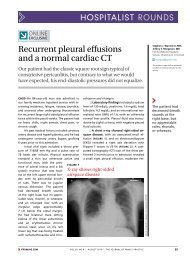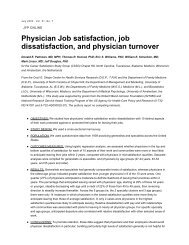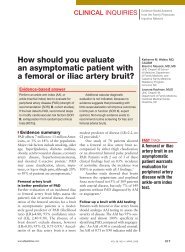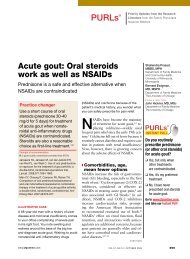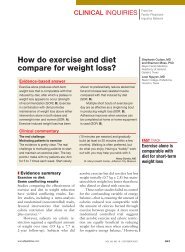Clinical Inquiries - The Journal of Family Practice
Clinical Inquiries - The Journal of Family Practice
Clinical Inquiries - The Journal of Family Practice
Create successful ePaper yourself
Turn your PDF publications into a flip-book with our unique Google optimized e-Paper software.
Beta-blocker therapy must be<br />
initiated using low doses and when<br />
patients are hemodynamically stable<br />
ed. <strong>The</strong> largest placebo-controlled trial in heart<br />
failure failed to detect a significant decrease in<br />
sudden death. 6<br />
Meta-analyses, weakened by heterogeneity<br />
and the inclusion <strong>of</strong> patients without heart failure,<br />
detected a significant 21% to 25% RRR for<br />
sudden death, 7,8 and an ARR <strong>of</strong> 2% to 3% per<br />
year. <strong>The</strong> pooled data from the placebocontrolled<br />
heart failure trials showed nonsignificant<br />
trends: 1.6% per year ARR for sudden<br />
death, 0.6% per year for total mortality.<br />
<strong>The</strong>se possible benefits must be balanced<br />
against the risk <strong>of</strong> harm from amiodarone,<br />
including excess rates <strong>of</strong> pulmonary infiltrate<br />
(1.1% per year), thyroid dysfunction (6.8% per<br />
year), liver enzyme abnormalities (0.6% per<br />
year), neuropathy (0.3% per year), and bradycardia<br />
(1.6% per year), as well as a discontinuation<br />
rate <strong>of</strong> 41% compared with 27% for placebo. 7 No<br />
evidence suggested that use <strong>of</strong> amiodarone in<br />
patients with heart failure increased mortality.<br />
Class I antiarrhythmics and other class III<br />
agents have not been studied in heart failure<br />
trials, but were associated with increased mortality<br />
in studies <strong>of</strong> patients at high risk for<br />
ventricular arrhythmia, 9,10 including patients<br />
with left ventricular dysfunction. Because this<br />
increase in mortality is thought to be due to proarrhythmic<br />
properties <strong>of</strong> the drugs, further trials<br />
in heart failure patients are unlikely to occur.<br />
■ RECOMMENDATIONS FROM OTHERS<br />
American College <strong>of</strong> Cardiology/American Heart<br />
Association (ACC/AHA), 11 European Society <strong>of</strong><br />
Cardiology (ESC), 12 and Heart Failure Society <strong>of</strong><br />
America (HFSA) guidelines 13 address heart failure.<br />
ACC/AHA and ESC reports specifically<br />
mention that beta-blockers reduce sudden<br />
death. Both strongly support the use <strong>of</strong> betablockers<br />
in patients with heart failure.<br />
720 SEPTEMBER 2003 / VOL 52, NO 9 · <strong>The</strong> <strong>Journal</strong> <strong>of</strong> <strong>Family</strong> <strong>Practice</strong><br />
CLINICAL INQUIRIES<br />
ACC/AHA finds “conflicting evidence and/or<br />
a divergence <strong>of</strong> opinion about the usefulness/<br />
efficacy” <strong>of</strong> amiodarone to prevent sudden death<br />
and advises: “routine use <strong>of</strong> amiodarone to prevent<br />
sudden death is not recommended.” <strong>The</strong><br />
ESC and HFSA also recommend against routine<br />
use <strong>of</strong> amiodarone.<br />
All 3 guidelines, however, state that for the<br />
control <strong>of</strong> symptomatic arrhythmias in heart<br />
failure, amiodarone is the antiarrhythmic agent<br />
<strong>of</strong> choice. All 3 also recommend not using class<br />
I or other class III agents in heart failure.<br />
Thomas A. Ball, MD, and J. William Kerns,<br />
MD, Shenandoah Valley <strong>Family</strong> <strong>Practice</strong> Residency Program,<br />
Dept <strong>of</strong> <strong>Family</strong> <strong>Practice</strong>, Virginia Commonwealth University,<br />
Front Royal, Va; Joan Nashelsky, MLS, Iowa City, IA<br />
■ CLINICAL COMMENTARY<br />
Beta-blockers reduce mortality<br />
in patients with heart failure<br />
Numerous well-controlled clinical trials have<br />
conclusively demonstrated that beta-blockers<br />
reduce morbidity and mortality (including<br />
sudden death) in patients with systolic heart<br />
failure. <strong>The</strong>y are considered disease-modifying<br />
agents and their use is strongly encouraged.<br />
Beta-blocker therapy must be initiated using<br />
low doses and only when patients are hemodynamically<br />
stable, with gradual dose<br />
titrations to prevent acute decompensation.<br />
Evidence for amiodarone shows some reduction<br />
in sudden death, but these data are less<br />
compelling. Moreover, adverse effects and drug<br />
interactions complicate long-term amiodarone<br />
use. Use <strong>of</strong> class I (eg, flecainide, procainamide,<br />
propafenone) and other class III<br />
(sotalol) anti-arrhythmics to reduce sudden<br />
death is discouraged.<br />
Joseph Saseen, PharmD, BCPS, University <strong>of</strong><br />
Colorado Health Sciences Center, Denver<br />
REFERENCES<br />
1. Effect <strong>of</strong> metoprolol CR/XL in chronic heart failure.<br />
Metoprolol CR/XL Randomised Intervention Trial in<br />
Congestive Heart Failure (MERIT-HF). Lancet 1999; 353:<br />
2001–2007.<br />
2. <strong>The</strong> Cardiac Insufficiency Bisoprolol Study II (CIBIS-II): a



